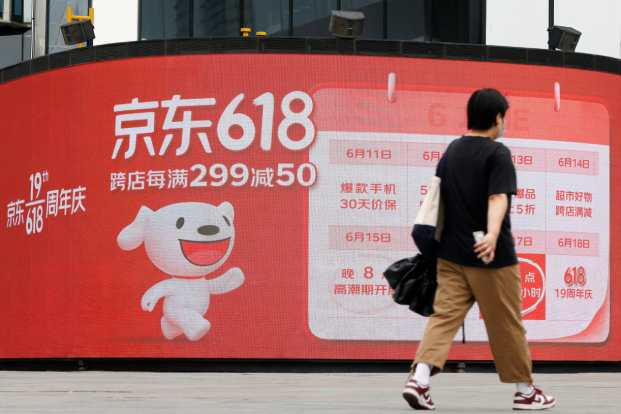China’s e-commerce giant JD.com has reported the slowest growth in sales in the first major shopping festival following the recent outbreak of the covid-19 disease.
Total sales over the “618” period rose 10.3% over the 18 days to Sunday, sharply down from the 2021 event’s growth of 27.7%, JD.com said on its official WeChat account.
The figures show how consumer appetite in China has been shrivelled by lockdowns to halt the Omicron variant of coronavirus and slowing economic conditions.
Chinese shoppers bought 379.3 billion yuan ($56.48 billion) of goods on JD’s platform over the “618” period.
“We are further improving delivery services in urban and rural areas,” it said in the statement, referring to efforts during the event that built on its supply chain infrastructure and digital intelligence technology.
Faltering Consumer Demand in Shopping Festivals
The 618 shopping event is China’s second largest shopping festival after Singles Day in November, and was initiated in 2004 to mark JD.com’s founding anniversary.
JD.com’s rivals, run by Alibaba Group and Pinduoduo tend not to publish 618 figures.
But Consultancy Syntun estimated that Alibaba’s Tmall marketplace, JD.com and Pinduoduo together achieved 578.4 billion yuan ($85.89 billion) worth of 618 sales last year, up 26.5% on the year.
Shopping festivals have traditionally been popular in China, with many buyers delaying purchases to benefit from the massive discounts they offer to entice shoppers.
But there were already signs last year of faltering consumer demand at such events, when rival Alibaba saw sales growth of just 8.5% during its Singles Day frenzy, also its slowest ever.
Over the last three months, China’s battle to restrain Covid-19 has brought lockdown measures of varying intensity in dozens of cities, in turn hitting spending, livelihoods and supply chains.
To stimulate demand this year major e-commerce platforms pushed brands to offer bigger discounts for the 618 event, but some companies and agents told Reuters they planned to scale down such participation.
Apart from e-commerce firms, more internet platforms and offline stores joined this year’s event, among them short video platforms Douyin and Kuaishou.
- Reuters with additional editing by Sean O’Meara
ALSO READ:
























